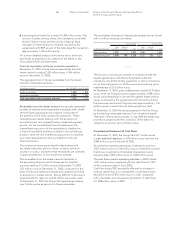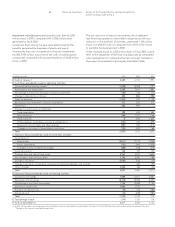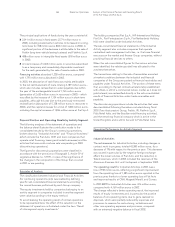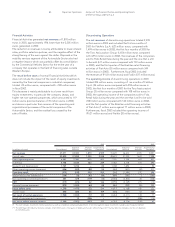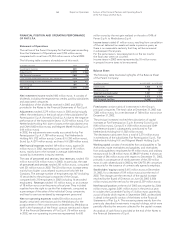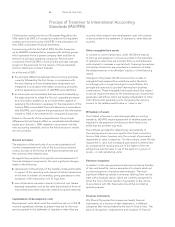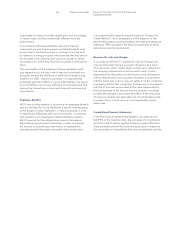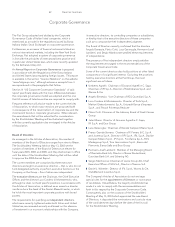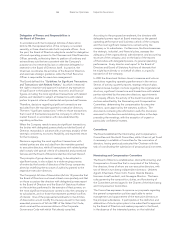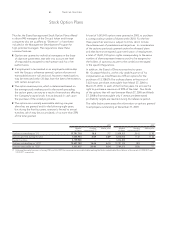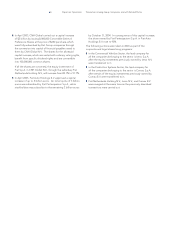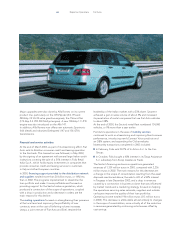Chrysler 2003 Annual Report Download - page 39
Download and view the complete annual report
Please find page 39 of the 2003 Chrysler annual report below. You can navigate through the pages in the report by either clicking on the pages listed below, or by using the keyword search tool below to find specific information within the annual report.
38 Report on Operations Corporate Governance
Delegation of Powers and Responsibilities in
the Board of Directors
In accordance with the Company’s Articles of Association
(Article 18), the representation of the company is invested,
severally, in those directors who hold corporate offices. As in
the past, the Board of Directors adopted a model for delegation
of broad operating powers to the Chairman and Chief Executive
Officer, severally, authorizing them to perform all ordinary and
extraordinary acts that are consistent with the Company’s
purpose and not reserved by law or otherwise delegated or
reserved to the Board of Directors itself. In practice, the
Chairman coordinates the activities of the Board of Directors
and exercises strategic guidance, while the Chief Executive
Officer is responsible for executive management.
The Board defined the “Guidelines for Significant Transactions
and Transactions with Related Parties,” by which it reserved
the right to examine and approve in advance any transaction
of significance in the balance sheet, economic and financial
figures, including the most significant transactions with related
parties, and decided to subject all transactions with related
parties to special criteria of substantial and procedural fairness.
Therefore, decisions regarding significant transactions are
excluded from the mandate granted to executive directors.
The term “significant transactions” refers to those transactions
that in and of themselves require the company to inform the
market thereof, in accordance with rules established by
regulatory authorities.
When the Company needs to execute significant transactions,
the bodies with delegated powers shall provide the Board of
Directors reasonably in advance with a summary analysis of the
strategic consistency, economic feasibility, and expected return
for the Company.
Decisions regarding the most significant transactions with
related parties are also excluded from the mandate granted
to executive directors, while all transactions with related parties
shall comply with special criteria of substantial and procedural
fairness and the Board of Directors shall be informed thereof.
The principle of group decision making, to be adopted in
significant cases, is also subject to a wide ranging process
of review by the boards of directors of the Group companies
aimed at redefining the structure of authority granted to the
respective executive directors.
The Company’s Articles of Association (Article 15) prescribe that
the Board of Directors must meet at least once quarterly and that
on those occasions the directors with delegated powers report
to the Board of Directors and the Board of Statutory Auditors
on the activities performed in the exercise of their powers, on
the most significant transactions carried out by the company or
its subsidiaries, and on those that represent potential conflicts
of interest. One of the proposed amendments to the Articles
of Association would modify this clause pursuant to the newly
amended provisions of Article 2381 of the Italian Civil Code,
which received the recommendations of the Corporate
Governance Code with which Fiat already complied.
According to the proposed amendment, the directors with
delegated powers report at Board meetings on the general
operating performance and business outlook of the company
and the most significant transactions carried out by the
company or its subsidiaries. Furthermore, the Board examines
the strategic, industrial, and financial plans, assesses the
adequacy of the organizational, administrative, and accounting
structure of the company, and, on the basis of the reports
of the bodies with delegated powers, its general operating
performance. Every director must report to the Board of
Directors and Board of Statutory Auditors all interests that
he might have directly or on behalf of others in a specific
transaction of the company.
In 2003 the Board met thirteen times to examine and vote on
resolutions regarding operating performance in the various
Sectors of activity, quarterly reports, strategic relaunch plan,
capital increase, budget, motions regarding the organizational
structure, significant transactions and transactions with related
parties submitted by the executive directors, appointments
of company officers, the activity of the Audit Committee, and
motions submitted by the Nominating and Compensation
Committee, determining the compensation for executive
directors, upon approval by the statutory auditors. The
documents containing the information useful for discussion
were sent to the directors and statutory auditors in the days
preceding the meetings, with the exception of urgent or
particularly confidential matters.
Committees
The Board established the Nominating and Compensation
Committee and the Audit Committee, while it has not yet found
it necessary to establish a Committee for the nomination of
directors, having previously entrusted the Chairman with the
task of coordinating the submission of proposals and nominees.
Nominating and Compensation Committee
The Board of Directors established an internal Nominating and
Compensation Committee that is comprised of the following
five directors, three of whom are non-executive directors, with
two of these in turn being independent directors: Umberto
Agnelli (Chairman), Flavio Cotti, Franzo Grande Stevens,
Hermann Josef Lamberti, and Giuseppe Morchio. The basic
rules governing the composition, duties, and functioning of
the Committee are envisaged in the Charter of the Nominating
and Compensation Committee.
The Committee expresses its opinions on proposals regarding
the general compensation policies applicable to senior
management and appointment of the executive directors at
the principal subsidiaries. It participates in the definition and
elaboration of stock option plans to be submitted for approval
by the Board of Directors and makes proposals to the Board,
in the absence of the interested parties, on the individual


